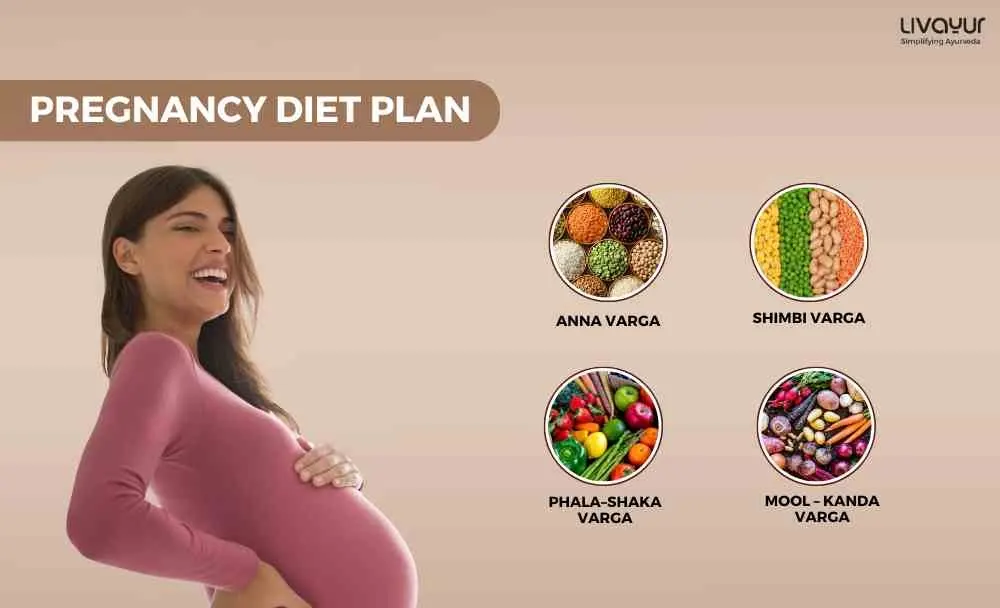
Pregnancy is a transformative journey filled with anticipation and excitement in a woman’s life. As a mother-to-be, taking care of your health becomes paramount, and your diet plays a crucial role in ensuring a healthy pregnancy and the well-being of your growing baby. An inadequate or excessive amount of certain nutrients can lead to medical problems for both the fetus and the mother. Thus, a well-balanced pregnancy diet plan is essential to provide essential nutrients, support fetal development, and minimize potential risks. [1]
The initial trimester stands out as a pivotal stage in Pregnancy. If the mother has harmful substances circulating in her bloodstream, it can lead to congenital disabilities in the baby. Therefore, it is advisable to refrain from taking any medication during this time unless it is specifically prescribed by a qualified Vaidya and follow a proper first-trimester pregnancy diet plan. [2]
In this comprehensive guide, we will study a diet plan during Pregnancy, what to eat, and what to avoid during Pregnancy, helping you make informed dietary choices for a happy and healthy pregnancy.
What to Eat During Pregnancy
The first trimester
It is recommended to incorporate sweet, cold, and liquid forms of nourishment, as advised by Sushrut in your pregnancy diet plan. This approach is particularly beneficial during this period due to the fetus’s early development within the uterus, which is relatively unstable. Here are some dietary examples that align with this guidance:
Singhoda (Water Chestnut): Singhoda is considered a ‘Garbhasthapan food,’ as it helps stabilize the fetus and assists in securing the placenta and is great in your early pregnancy diet plan. Mixing Singhoda powder (1 tablespoon) with lukewarm milk and ghee can be highly beneficial. You can also consume 3 to 4 cups of whole milk daily during this period. The regular use of cow’s ghee with milk can also be an advantageous addition to your pregnancy diet plan during early Pregnancy. [2]
Third Month
In the third month, it is advisable to incorporate rice with milk into the pregnancy diet plan more frequently and in larger quantities, especially during the first course of meals, such as early breakfast and lunch. [2]
Fourth Month
During this stage, the fetal heart begins to function. To support the growing fetus, consuming more ‘Kapha’ and ‘Rakta’ (nourishing fluids) in your pregnancy diet plan is essential. Curds with rice and ghee are recommended to be consumed in greater quantities during this month. Moreover, increasing food intake during daytime meals, such as breakfast and lunch, is advisable. [2]
Fifth Month
As the mother’s mind becomes increasingly active during the fifth month, it is essential to provide wholesome foods for the mind and heart (‘Hridya’). Ayurveda suggests incorporating rice with cow’s milk into the pregnancy diet plan, as this milk is believed to be conducive to developing the mind. [2]
Sixth Month
During the sixth month, as the faculties of recollection (Smriti) and perception (Buddhi) begin to function, the consumption of cow’s ghee can help. Incorporate an appropriate amount of ghee with rice into the pregnancy diet plan to support these cognitive functions. [2] In the sixth month, incorporating Gokshura, a natural diuretic, can be beneficial in preventing water retention and its associated complications. [3]
Seventh Month
In the seventh month, the genesis of various body organs and components such as blood (Rakta), bones (Asthi), and intellect (Medhya) is significant. However, it is important to note that addressing these specific requirements may vary for each individual based on their body constitution. [2]During the seventh month, the use of drugs from the Vidarigandhadi group can provide diuretic and anabolic effects and is a great addition to your pregnancy diet plan. These drugs are known to alleviate emaciation and help regulate Pitta and Kapha Doshas. Regular usage during this stage may contribute to the overall well-being of both the mother and her developing fetus. [3]
Eighth Month
Asthapana basti with badara kwatha mixed with bala, atibala, shatapushpa
Ksheera yavagu mixed with ghrita
Asthapana basti with badari kwatha
Anuvasana basti with taila with medicated madhura aushadha
Harita Ksheera yavagu [3]
Ninth Month
Anuvasana basti with taila prepared with madhura aushadha
Snehayukta yavagu, jangala mamsa rasa up to the period of delivery
Different varieties of cereals [3]
Foods to consume during Pregnancy

| Cereals (Anna Varga) | Pulses (Shimbi Varga) | Fruit & Vegetables (Phala–Shaka Varga) | Root and Tubers (Mool – Kanda Varga) |
| Rice | Green gram | Bottle gourd | Potato |
| Jowar | Green pea | Snake gourd | Sweet potato |
| Barley | Black gram | Cucumber | Carrots |
| Wheat | Bengal gram | Tinda | Radish |
| Ragi | Soya bean | Lady’s finger (okra) | Onion |
| Maize | Red gram | Parwal | Garlic |
| Bajra | Cluster beans | Ridge gourd | Ginger |
| Kidney beans (red) | Red pumpkin | Yam | |
| French beans | Drumstick | Turmeric | |
| Double beans | Ash gourd | Beetroot | |
| Tomato | Tapioca (sago) |
| Green Leafy Vegetables | Milk and Milk Products (Dugdha Varga) | Flesh Foods (Mamsa Varga) | Fruits (Phala Varga) (Fresh and Dry) | Other Healthy Foods |
| Spinach | Whole milk | Goat meat | Banana | Garden cress seeds |
| Lettuce | Ghee | Titer (Partridge, Bird variety) | Apple | Cardamom |
| Cauliflower leaves | Butter | Chicken | Dates | Coriander leaves |
| Curry leaves | Paneer (cottage cheese) | Sardine fish | Grapes | Clove |
| Coriander leaves | Buttermilk | Crabs | Pomegranate | Nutmeg |
| Mint | Curds (yogurt) | Goat liver | Figs | Onion |
| Cabbage | Cheese | Chicken liver | Jackfruit | Tamarind |
| Fenugreek | Shrikhanda | Eggs | Lime | Dry ginger powder |
| Drumstick leaves | Ice creams (in moderation) | Cod-liver oil | Oranges | Black pepper |
| Amaranth leaves | Cow’s milk and ghee | Salmon | Mango | Rock salt |
| Pork should be consumed in moderation. | Pear | Arrowroot | ||
| Phalsa | Sugar | |||
| Dried figs | Jaggery | |||
| Raisins | ||||
| Apricot | ||||
| Almond | ||||
| Dried dates | ||||
| Fresh Amla (Indian gooseberry) is highly beneficial for expecting mothers. Consuming one Amla everyday provides essential nutrition during Pregnancy. |
Foods to avoid during Pregnancy
| Mushrooms |
| Tea |
| Coffee |
| Soft drinks |
| Wines and alcoholic beverages should be avoided during Pregnancy for the well-being of both the mother and the developing baby. |
| Guava, berries, and custard apples may be challenging to digest and are better avoided. |
| Excessive consumption of dry salted fish should be avoided. |
FAQs
1. What healthy foods can be included/avoided in your post-pregnancy diet plan?
Consuming foods abundant in calories, proteins, iron, vitamins, and various essential micronutrients is advisable. During lactation, a mother should aim for an additional daily calorie intake of approximately 550 Kcal for the initial six months and 400 Kcal for the subsequent six months, compared to her dietary requirements before Pregnancy. Alcohol and caffeine should be avoided. [4]
2. What should be included in the pregnancy diet plan for the first trimester to deal with nausea?
During the first trimester of Pregnancy, many women commonly encounter nausea and vomiting, making it challenging to maintain a balanced diet. To prevent dehydration and ensure essential nourishment, opting for a diet consisting of cold, sweet liquids and milk is advisable. Apart from this, incorporating anabolic drugs from the Madura group can aid in preserving the overall health of both the mother and the developing fetus. [3]
3. How can breastfeeding practices offer valuable support for managing postpartum weight effectively?
It is recommended that postpartum women exclusively breastfeed their infants for the initial six months and continue with complementary feeding for up to two years. Combining exclusive breastfeeding with other weight management strategies can enhance postpartum weight loss. [5]
Conclusion
A well-balanced pregnancy diet plan is essential for ensuring a healthy pregnancy and supporting the development of your growing baby. Focusing on nutrient-rich foods, staying hydrated, and avoiding harmful substances can optimize your chances of a smooth pregnancy and a healthy baby. You can expect to have a happy and healthy pregnancy with proper nutrition and care.
Disclaimer:
This article is written from a health and wellness perspective and is notmedical advice. Kindly seek the help of a certified medical practitioner before initiating any treatment.
References:
- Nutrition in Pregnancy
- Food In Pregnancy An Ayurvedic Overview
- ROLE OF NUTRITIOUS DIET IN PREGNANCY IN AYURVEDIC PERSPECTIVE
- Knowledge Regarding Postnatal Diet among Postnatal Mothers
- Clinical Practice Guidelines for Weight Management in Postpartum Women: An AIIMS-DST Initiative in Association with FOGSI

















